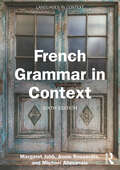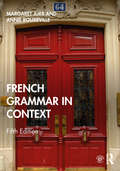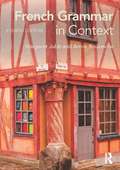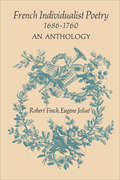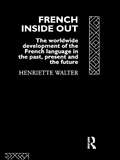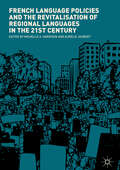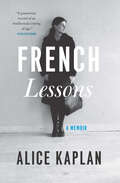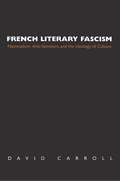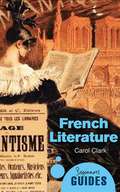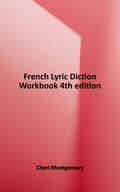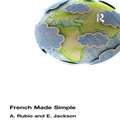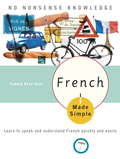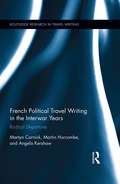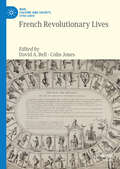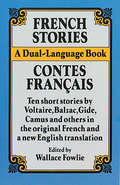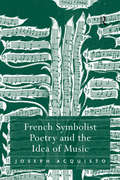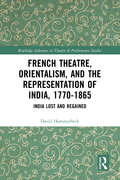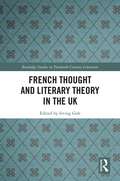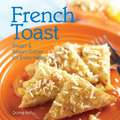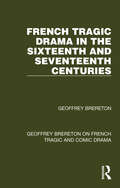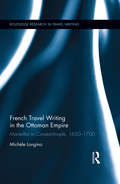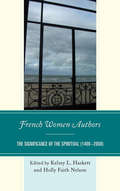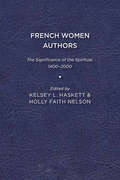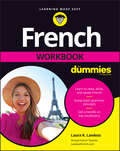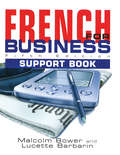- Table View
- List View
French Grammar in Context (Languages in Context)
by Margaret Jubb Annie Rouxeville Michaël AbecassisFrench Grammar in Context presents a unique and exciting approach to learning grammar and this revised sixth edition includes new chapters on language registers and regional varieties, as well as three additional revision texts.Authentic texts from a rich variety of sources, literary and journalistic, are used as the starting point for the illustration and explanation of key areas of French grammar, with each point consolidated with a wide range of written and spoken exercises. Grammar is presented not as an end in itself, but as a tool essential to enjoying French, understanding native speakers, and communicating effectively with them.Literary texts and poems are taken from renowned French and Francophone authors such as Albert Camus, Émile Zola, Leïla Slimani, André Malraux, Amélie Nothomb, Alain Robbe-Grillet, Stendhal, Jacques Prévert, and Maryse Condé. News sources include Libération, Le Point, Marianne, and Le Monde Diplomatique, in addition to articles from regional papers such as Ouest-France and La Voix du Nord. Lifestyle articles are included from magazines such as Elle.French Grammar in Context is aimed at intermediate and advanced students and is ideal for both independent and class-based study.
French Grammar in Context: Analysis And Practice (Languages in Context)
by Margaret Jubb Annie RouxevilleNow in its fifth edition, French Grammar in Context presents a unique and exciting approach to learning grammar. Authentic texts from a rich variety of sources, literary and journalistic, are used as the starting point for the illustration and explanation of key areas of French grammar. Each point is consolidated with a wide range of written and spoken exercises. Grammar is presented not as an end in itself, but as a tool essential to enjoying French, understanding native speakers and communicating effectively with them. Literary texts and poems are taken from renowned French authors such as Albert Camus, Zola, André Malraux, Alain Robbe-Grillet, Stendhal and Jacques Prévert. News sources include Libération, Le Point, Marianne, and Le Monde Diplomatique, in addition to articles from regional papers such as Ouest-France and La Voix du Nord. Lifestyle articles are included from magazines such as Elle. This fifth edition has been updated to include new texts for Chapters 24 and 25 and two new revision texts. In addition, this new edition is supported by a revised and extended companion website that offers a wealth of additional interactive exercises to practise and reinforce the material covered. French Grammar in Context is aimed at intermediate and advanced students and is ideal for both independent and class-based study.
French Grammar in Context: Analysis and Practice
by Margaret Jubb Annie RouxevilleFirst published in 2014. Routledge is an imprint of Taylor & Francis, an informa company.
French Individualist Poetry 1686-1760: An Anthology
by Robert Finch Eugène JoliatThis anthology has a double aim: to present a body of poetry, none of it easily available, some of it never before reproduced, and to point up a particular trend, until now nearly lost sight of in the maze of generalizations about eighteenth-century French poetry. This trend, called individualist, in contradistinction to the academic and universalist trends of the century, has been chosen since it is the least known and most original of the three. The individualist poets are avowed moderns, and their attitude toward poetry and their concept of its nature often anticipate attitudes held by our poets of our own time. There has not been available to this point a sufficiently representative body of poems by these poets, a gap that Professors Finch and Joliat have attempts to fill with their anthology. Readers will find the notes to the poems especially useful, since many of them provide out-of-the-way background material and, as well, offer new insights into the poetry of the individualist poets as a group.
French Inside Out: The Worldwide Development of the French Language in the Past, the Present and the Future
by Henriette WalterFirst published in 1993. Routledge is an imprint of Taylor & Francis, an informa company.
French Language Policies and the Revitalisation of Regional Languages in the 21st Century
by Michelle A. Harrison Aurélie JoubertThis edited volume presents an analysis of the evolution of French language policies and their impact on French regional languages and their communities. It gathers studies on language revitalisation from several territorial minority languages (Breton, Alsatian, Catalan, Occitan, Basque, Corsican, Francoprovençal, Picard, Reunionese) and evaluates the challenges and opportunities that they face in the 21st century. The chapters tackle different aspects of language endangerment and language planning and adopt varied theoretical and methodological approaches. The first section of the book reconsiders the difficulties in establishing linguistic boundaries and classification for some regional languages. The second section examines the important theme of the new generation of speakers with issues of transmission and identity formation and the changes they can bring to traditional communities. The third section highlights new developments in the context of new technologies and the heightened visibility of regional languages. Finally, the last section presents an overview of the contemporary situation of minority language revitalisation in France and synthesises the key trends identified in this volume: from the educational domain to the European Charter for Minority and Regional languages. This book will appeal to students and scholars of the sociology of language, sociolinguistics, language policy, minority languages and language endangerment.
French Lessons: A Memoir
by Alice KaplanBrilliantly uniting the personal and the critical, French Lessons is a powerful autobiographical experiment. It tells the story of an American woman escaping into the French language and of a scholar and teacher coming to grips with her history of learning. Kaplan begins with a distinctly American quest for an imaginary France of the intelligence. But soon her infatuation with all things French comes up against the dark, unimagined recesses of French political and cultural life. The daughter of a Jewish lawyer who prosecuted Nazi war criminals at Nuremburg, Kaplan grew up in the 1960s in the Midwest. After her father's death when she was seven, French became her way of "leaving home" and finding herself in another language and culture. In spare, midwestern prose, by turns intimate and wry, Kaplan describes how, as a student in a Swiss boarding school and later in a junior year abroad in Bordeaux, she passionately sought the French "r," attentively honed her accent, and learned the idioms of her French lover. When, as a graduate student, her passion for French culture turned to the elegance and sophistication of its intellectual life, she found herself drawn to the language and style of the novelist Louis-Ferdinand Celine. At the same time she was repulsed by his anti-Semitism. At Yale in the late 70s, during the heyday of deconstruction she chose to transgress its apolitical purity and work on a subject "that made history impossible to ignore:" French fascist intellectuals. Kaplan's discussion of the "de Man affair" — the discovery that her brilliant and charismatic Yale professor had written compromising articles for the pro-Nazi Belgian press—and her personal account of the paradoxes of deconstruction are among the most compelling available on this subject. French Lessons belongs in the company of Sartre's Words and the memoirs of Nathalie Sarraute, Annie Ernaux, and Eva Hoffman. No book so engrossingly conveys both the excitement of learning and the moral dilemmas of the intellectual life.
French Literary Fascism: Nationalism, Anti-Semitism, and the Ideology of Culture
by David CarrollThis is the first book to provide a sustained critical analysis of the literary-aesthetic dimension of French fascism--the peculiarly French form of what Walter Benjamin called the fascist "aestheticizing of politics." Focusing first on three important extremist nationalist writers at the turn of the century and then on five of the most visible fascist intellectuals in France in the 1930s, David Carroll shows how both traditional and modern concepts of art figure in the elaboration of fascist ideology--and in the presentation of fascism as an art of the political. Carroll is concerned with the internal relations of fascism and literature--how literary fascists conceived of politics as a technique for fashioning a unified people and transforming the disparate elements of society into an organic, totalized work of art. He explores the logic of such aestheticizing, as well as the assumptions about art, literature, and culture at the basis of both the aesthetics and politics of French literary fascists. His book reveals how not only classical humanism but also modern aesthetics that defend the autonomy and integrity of literature became models for xenophobic forms of nationalism and extreme "cultural" forms of anti-Semitism. A cogent analysis of the ideological function of literature and culture in fascism, this work helps us see the ramifications of thinking of literature or art as the truth or essence of politics.
French Literature: A Beginner's Guide (Beginner's Guides)
by Carol ClarkBoasting one of Western culture's oldest and richest literary traditions, French literature has long been a pioneer of style and innovation. From the farcical comedies of Molière to the torment of Baudelaire's verse, it has inspired writers and artists everywhere throughout the ages. This comprehensive Beginner's Guide tells French Literature's compelling story from the beginning right up to today. Highlighting its distinct qualities, Carol Clark explores how the literary styles of different periods took shape and shows what we can gain from reading classic and modern French works. With translations and explanations of noteworthy extracts from celebrated writers, this is the perfect resource for anyone who wants to discover the delights French literature offers. Carol Clark is Emeritus Fellow of Balliol College and former University Lecturer in French at the University of Oxford. She has translated works by Baudelaire, Proust, and Rostand for Penguin Classics.
French Lyric Diction Workbook, Fourth edition
by Cheri MontgomeryA graded method of phonetic transcription that employs frequently occurring words from French art song literature. 4th edition, published in 2014
French Made Simple
by E. Jackson A. RubioThis is as complete beginner's course in French which covers the requirements of the various GCSE examination syllabuses, and provides a good background to the language for students on RSA and other similar courses. The approach is designed to be of particular value for further education and self-study purposes.
French Made Simple: Learn to speak and understand French quickly and easily (Made Simple)
by Pamela Rose HazeFrench Made Simple will help you learn to speak French quickly and easily! An invaluable introduction to one of the most studied languages, French Made Simple is ideal for students, business professionals, and tourists alike. Teaching the basics of grammar, vocabulary, and culture, it guides you step-by-step through the process of learning and conversing quickly. Refreshingly easy to understand, French Made Simple includes: • Grammar basics • Modern vocabulary • Helpful verb chart • French-English dictionary • Reading exercises • Economic information • Common expressions • Review quizzes • Complete answer key
French Political Travel Writing in the Interwar Years: Radical Departures (Routledge Research in Travel Writing)
by Angela Kershaw Martyn Cornick Martin HurcombeThis book studies travel writing produced by French authors between the two World Wars following visits to authoritarian regimes in Europe and the Union of Soviet Socialist Republics (USSR). It sheds new light on the phenomenon of French political travel in this period by considering the well-documented appeal of Soviet communism for French intellectuals alongside their interest in other radical regimes which have been much less studied: fascist Italy, the Iberian dictatorships and Nazi Germany. Through analyses of the travel writing produced as a result of such visits, the book gauges the appeal of these forms of authoritarianism for inter-war French intellectuals from a broad political spectrum. It examines not only those whose political sympathies with the extreme right or extreme left were already publicly known, but also non-aligned intellectuals who were interested in political models that offered an apparently radical alternative to the French Third Republic. This study shows how travel writing provided a space for reflection on the lessons France might learn from the radical political experiments of the inter-war years. It argues that such writing can usefully be read as a form of utopian thinking, distinguishing this from colloquial understandings of utopia as an ideal location. Utopianism is understood neither as a fantasy ungrounded in the real nor as a dangerously totalitarian ideal, but, in line with Karl Mannheim, Paul Ricœur, and Ruth Levitas, as a form of non-congruence with the real that it seeks to transcend. The utopianism of French political travel writing is seen to lie not in the attempt to portray the destination visited as utopia, but rather in the pursuit of a dialogue with radical political alterity.
French Revolutionary Lives (War, Culture and Society, 1750–1850)
by Colin Jones David A. BellHistorians have long used biography and life narratives as a means of understanding the French Revolution, as classic studies on major figures such as Robespierre and Napoleon attest. At the current moment, however, many of the most creative such studies are focusing on relatively minor revolutionary figures. Such work, which combines the techniques of classic biography and microhistory, reveals how the great political, social, cultural and religious transformations of the revolutionary era were refracted through the prism of individual experience. This work often links to research and writing taking place in adjacent disciplines, notably around the ideas and practices of life-writing. These studies, themselves often grounded in the history of emotions, resist the 'biographical illusion' that an individual’s essence can be inferred unproblematically from their words and actions, and they also transcend the tendency to see those words and actions as merely symptoms of broader political processes. By focusing on individual life stories in their own right and insisting on the slipperiness of individual identity, this book explores emergent forms of subjectivity.
French Stories/Contes Francais: A Dual-Language Book (Dover Dual Language French)
by Wallace Fowlie"The selections are good and the translations are excellent."-Germaine Brée, New York UniversityDrawn from two centuries of French literature, these superb selections by ten great writers span a wide variety of styles, philosophies, and literary creeds. The stories reflect not only the beliefs of various literary schools, but the preoccupations of French civilization, at the various times of their composition, with the metaphysical and psychological problems of man. Contents include Micromégas (Voltaire), La Messe de l'Athée (Honoré de Balzac), La Légende de Saint Julien l'Hospitalier (Gustave Flaubert), Le Spleen de Paris (Charles Baudelaire), Menuet (Guy de Maupassant), Mort de Judas (Paul Claudel), Le Retour de l'Enfant Prodigue (André Gide), Grand-Lebrun (François Mauriac), Le Passe-Muraille (Marcel Aymé), and L'Hôte (Albert Camus). Students of French, or those who wish to refresh their knowledge of the language, will welcome this treasury of masterly fiction. The selections are arranged chronologically, allowing the reader to witness the development of French literary art -- from Voltaire to Camus. Excellent English translations appear on pages facing the Original French. Also included are a French-English vocabulary list, textural notes, and exercises.
French Symbolist Poetry and the Idea of Music
by Joseph AcquistoWhat role did music play in the creation of a new aesthetics of poetry in French from the 1860s to the 1930s? How did music serve as an unassimilable 'other' against which the French symbolist poets crafted a new poetics? And why did music gradually disappear from early twentieth-century poetic discourse? These are among the questions Joseph Acquisto poses in his lively study of the ways in which Baudelaire, Mallarmé, Ghil, and Royère question the nature and function of the lyric through an ever-shifting set of intertextual and cultural contexts. Rather than focusing on 'musicality' in verse, the author addresses the consequences of choosing music as a site of dialogue with poetry. Acquisto argues that memory plays an under acknowledged yet vital role in these poets' rewriting of symbolist poetics. His reading of their interactions, and his focus on both major and neglected poets, exposes the myth of a small handful of 'great authors' shaping symbolism while a host of disciples propagated the tradition. Rather, Acquisto proposes, the multiplicity of authors writing and rewriting symbolism invites a dialogic approach to the poetics of the period. Moreover, music, as theorized rather than performed or heard, serves as a privileged mobile space of poetic creation and dialogue for these poet-critics; it is through engagement with music, supposedly the purest or most abstract of the arts, that one can retrace the textual and cultural transformations accomplished by the symbolist tradition. By extension, these poets' rethinking of poetics is an occasion for present-day critics to re-examine assumptions, not only about the intersections of music and poetry and our understanding of symbolist poetics but also about the role that the aesthetic implicitly plays in the creation, preservation, or reshaping of cultural memory.
French Theatre, Orientalism, and the Representation of India, 1770-1865: India Lost and Regained (Routledge Advances in Theatre & Performance Studies)
by David HammerbeckThis book examines the French theatricalization of India from 1770 to 1865 and how a range of plays not only represented India to the French viewing public but also staged issues within French culture including colonialism, imperialism, race, gender, and national politics. Through examining these texts and available performance history, and incorporating historical texts and cultural theory, David Hammerback analyses these works to illustrate a complex of cultural representations: some contested Orientalism, some participated in Western colonialist discourses, while some can be placed somewhere between these two markers of ideology in Western culture and the arts. He also assesses the works which participated in shaping the theatrical face of Western hegemony, ones directly participating in Orientalism as delineated by Edward Said and others. This book will be of great interest to students and scholars in theatre, French literature, history and cultural studies.
French Thought and Literary Theory in the UK (Routledge Studies in Twentieth-Century Literature)
by Irving GohThis collection presents a sort of counter-history or counter-genealogy of the globalization of French thought from the point of view of scholars working in the UK. While the dominating discourse would attribute the US as the source of that globalization, particularly through the 1966 conference on the Languages of Criticism and the Sciences of Man at Johns Hopkins University, this volume of essays serves as a reminder that the UK has also been a principal motor of that globalization. The essays take into account how French thought and literary theory have institutionally taken shape in the UK from the 70s to today, highlight aspects of French thought that have been of particular pertinence or importance for scholars there, and outline how researchers in the UK today are bringing French thought further in terms of teaching and research in this twenty-first century. In short, this volume traces how the country has been behind the reception and development of French thought in Anglophone worlds from the late 70s to the present.
French Toast: Sweet and Savory Treats for Every Meal
by Donna KellyPush aside the syrup and rejuvenate a classic comfort food with these 70 easy-to-use, sweet and savoury recipes for lunch, dinner and dessert as well as breakfast. With beautiful colour photography, these tasty dishes range from classics like French Toast Blueberry Cobbler and French Toast Bread Pudding to creative casseroles and entrees such as Crab Strata Supreme and Tomato Basil Monte Cristos.
French Tragic Drama in the Sixteenth and Seventeenth Centuries: A Textbook On The Principles And Details Of Modern Construction First Stage (or Elementary Course) (Geoffrey Brereton on French Tragic and Comic Drama)
by Geoffrey BreretonOriginally published in 1973, the history of French tragedy and tragicomedy from their origins in the sixteenth century to the last years of Louis XIV’s reign is here surveyed in a single volume. Beginning with a brief account of the development of drama from the Middle Ages to the Renaissance, Dr Brereton examines the plays as types of drama, the circumstances in which they were produced and their reception by contemporaries. The traditionally great figures of Corneille and Racine are treated at some length, but their work is seen in perspective against the plays of their predecessors and of their own time. Garnier and Montchrestien are discussed, among others, as notable writers of Renaissance humanist tragedy. Sections are devoted to secondary but still important dramatists such as Mairet, Rotrou, Du Ryer, Tristan L’Hermite, Thomas Corneille and Quinault. A long chapter on Alexandre Hardy reviews the work of this neglected author and stresses his interest as a transitional link between the two centuries and as a vigorous pioneer of a type of drama which flourished for several decades after him concurrently with French ‘classical’ tragedy. The main currents of critical theory, social attitudes and stage history are described in their relation to the development of the drama. Well over a hundred plays are discussed or summarized; and the author has constantly referred back to the original material and has avoided an over-simplification of a vast subject which contains more exceptions and anomalies than has generally been recognized in the past. Chronological tables of the works of major dramatists, summaries of numerous plays and a bibliography containing modern editions of plays are included.
French Travel Writing in the Ottoman Empire: Marseilles to Constantinople, 1650-1700 (Routledge Research in Travel Writing)
by Michele LonginoExamining the history of the French experience of the Ottoman world and Turkey, this comparative study visits the accounts of early modern travelers for the insights they bring to the field of travel writing. The journals of contemporaries Jean-Baptiste Tavernier, Jean Thévenot, Laurent D’Arvieux, Guillaume-Joseph Grelot, Jean Chardin, and Antoine Galland reveal a rich corpus of political, social, and cultural elements relating to the Ottoman Empire at the time, enabling an appreciation of the diverse shapes that travel narratives can take at a distinct historical juncture. Longino examines how these writers construct themselves as authors, characters, and individuals in keeping with the central human project of individuation in the early modern era, also marking the differences that define each of these travelers – the shopper, the envoy, the voyeur, the arriviste, the ethnographer, the merchant. She shows how these narratives complicate and alter political and cultural paradigms in the fields of Mediterranean studies, 17th-century French studies, and cultural studies, arguing for their importance in the canon of early modern narrative forms, and specifically travel writing. The first study to examine these travel journals and writers together, this book will be of interest to a range of scholars covering travel writing, French literature, and history.
French Women Authors: The Significance of the Spiritual, 1400–2000
by Holly Faith Nelson Katharine Bubel Sinda Vanderpool Deborah Sullivan-Trainor Hadley Wood Kelsey L. Haskett Anne M. François Susan UdryFrench Women Authors examines the importance afforded the spiritual in the lives and works of French women authors over the centuries, thereby highlighting both the significance of spiritually informed writings in French literature in general, as well as the specific contribution made by women writers. Eleven different authors have been selected for this collection, representing major literary periods from the medieval to the (post)modern. Each author is examined in the light of a Christian worldview, creating an approach which both validates and interrogates the spiritual dimension of the works under consideration. At the same time, the book as a whole presents a broad perspective on French women writers, showing how they reflect or stand in opposition to their times. The chronological order of the chapters reveals an evolution in the modes of spirituality expressed by these authors and in the role of spiritual belief or religion in French society over time. From the overwhelmingly Christian culture of the Middle Ages and pre-Enlightenment France to the wide diversity prevalent in (post)modern times, including the rise of Islam within French borders, a radical shift has permeated French society, a shift that is reflected in the writers chosen for this book. Moreover, the sensitivity of women writers to the individual side of spiritual life, in contrast with the practices of organized religion, also emerges as a major trend in this book, with women often being seen as a voice for social and religious change, or for a more meaningful, personal faith. Lastly, despite a blatant rejection of God and religion, spiritual threads still run through the works of one of France’s most celebrated contemporary writers (Marguerite Duras), whose cry for an absolute in the midst of a spiritual vacuum only reiterates the quest for transcendence or for some form of spiritual expression, as voiced in the works of her female predecessors and contemporaries in France, and as demonstrated in this book. Published by University of Delaware Press. Distributed worldwide by Rutgers University Press.
French Women Authors: The Significance of the Spiritual, 1400–2000
by Holly Faith Nelson Katharine Bubel Sinda Vanderpool Deborah Sullivan-Trainor Hadley Wood Kelsey L. Haskett Anne M. François Susan UdryFrench Women Authors examines the importance afforded the spiritual in the lives and works of French women authors over the centuries, thereby highlighting both the significance of spiritually informed writings in French literature in general, as well as the specific contribution made by women writers. Eleven different authors have been selected for this collection, representing major literary periods from the medieval to the (post)modern. Each author is examined in the light of a Christian worldview, creating an approach which both validates and interrogates the spiritual dimension of the works under consideration. At the same time, the book as a whole presents a broad perspective on French women writers, showing how they reflect or stand in opposition to their times. The chronological order of the chapters reveals an evolution in the modes of spirituality expressed by these authors and in the role of spiritual belief or religion in French society over time. From the overwhelmingly Christian culture of the Middle Ages and pre-Enlightenment France to the wide diversity prevalent in (post)modern times, including the rise of Islam within French borders, a radical shift has permeated French society, a shift that is reflected in the writers chosen for this book. Moreover, the sensitivity of women writers to the individual side of spiritual life, in contrast with the practices of organized religion, also emerges as a major trend in this book, with women often being seen as a voice for social and religious change, or for a more meaningful, personal faith. Lastly, despite a blatant rejection of God and religion, spiritual threads still run through the works of one of France’s most celebrated contemporary writers (Marguerite Duras), whose cry for an absolute in the midst of a spiritual vacuum only reiterates the quest for transcendence or for some form of spiritual expression, as voiced in the works of her female predecessors and contemporaries in France, and as demonstrated in this book. Published by University of Delaware Press. Distributed worldwide by Rutgers University Press.
French Workbook For Dummies
by Laura K. LawlessWrite, read, work, and play—en Français French Workbook For Dummies is the perfect starting place for beginners who want to learn French. Packed with foundational grammar and integrated vocab, this hands-on book will set you on your way to picking up a new language. You&’ll find valuable practice lessons and exercises throughout that help you learn key vocabulary and phrases, writing in French, and understanding the fifth most commonly spoken language worldwide. Start with the very basics of the French language and work your way through important grammar and vocabulary Follow lessons at your own pace and complete practice exercises to hone your skill Learn using the Dummies method—based on evidence about how people learn best Gain the confidence to speak French in the workplace and while you travelFor anyone learning French for use at home, at the office, or on the go, French Workbook For Dummies is a vital asset.
French for Business: Students Book, 5th Edition (French For Business Ser.)
by Lucette Barbarin Malcolm BowerFirst published in 2002. Routledge is an imprint of Taylor & Francis, an informa company.
